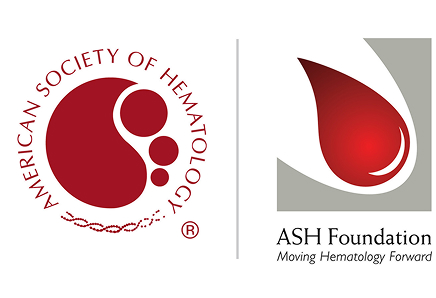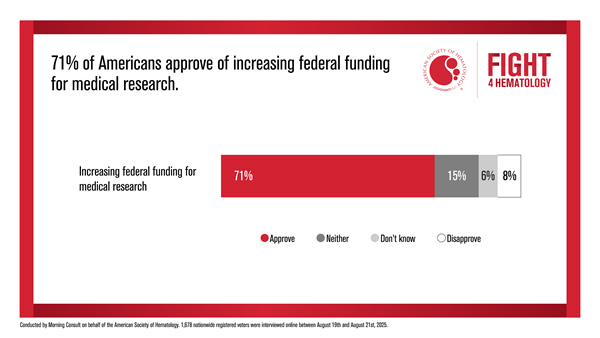#Fight4Hematology Action Hub
As the world’s largest professional society serving clinicians and scientists around the world who are working to conquer blood diseases, ASH is fighting for hematology in the face of executive orders and other federal actions that threaten hematology research and, ultimately, the care of patients.
ASH has created the #Fight4Hematology Action Hub to keep you up to date on ASH's efforts and provide four easy ways you can get involved to protect hematology research and advances in patient care. Together, we can drive meaningful change!
Join the FightSEE LATEST NEWS AND UPDATES
Congress Secures $48.7 Billion for the National Institutes of Health
ASH supports the passage of the bipartisan funding bill, which secures federal investment in NIH and key hematology research programs. Thank you to ASH members for advocating on behalf of the hematology community and joining the #Fight4Hematology. ASH looks forward to continuing the fight in FY 2027.
Join the Fight
You can join the #Fight4Hematology by taking one (or more) of the four critical actions outlined below. Together, we can protect the future of hematology research and patient care.
Voices From the Frontlines
ASH is reaching out to patients, caregivers, clinicians, scientists, and other stakeholders dealing with blood diseases and disorders to learn about their experiences and shed light on the importance of federal programs that either support scientific research or provide access to health care.
Research Saves Lives
Deep cuts at the National Institutes of Health (NIH) are poised to have a ripple effect on multiple fronts, including local economies, scientific research, the U.S. stature as a global leader, and, significantly, the lives of countless patients.


Advocate
The future of biomedical research and health care is in jeopardy, threatening U.S. innovation and putting the lives of millions with blood disorders at risk. It is critical that the hematology community come together to opposes these changes.

Protect Research Funding
Urge your members of Congress to support the highest possible funding level for National Institutes of Health (NIH).

Extend ACA Tax Credits
Share an example of how costs have impacted the ability of your patients to seek diagnosis or treatment.

Join the Grassroots Network
Members of the ASH Grassroots Network receive regular updates about ASH's advocacy efforts impacting hematology. Join today and become a hematology advocate.
Advocacy Toolkit
ASH has created an advocacy toolkit, including fact sheets, infographics, and talking points, to support discussions with legislators, serve as “leave behind” documents after meetings, and enhance written and phone communications.
ASH Advocacy Training Webinar: Your Voice Is Needed in These Challenging Times
The webinar highlights ASH’s #Fight4Hematology campaign, shares strategies for effectively engaging with elected officials, outlines ASH’s top policy priorities, and provides tools to help drive real change for hematologists and patients.
“I don’t know if I would still be alive if I hadn’t had access to Medicaid when I needed it.”

Share Your Story
Make your voice heard in Congress by sharing how executive orders and other federal actions are affecting hematology research, patient care, and medical advances — because your experience can drive meaningful change.
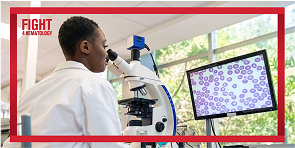
Take ASH’s NEW Survey on NIH Funding Cuts and Delays
Take ASH’s survey to share how the Administration’s policies have impacted your research. Since the Administration took office, policies have been implemented that delay or restrict the release of appropriated funding for peer-reviewed grants, and we need to hear about how these changes are impacting you to inform ASH’s advocacy with the Administration and Congress. Take the SurveyASH Letter to the Editor Toolkit
This toolkit aims to give hematologists guidance on how to influence policy makers, local leaders, and individuals in their communities through timely and well-written letters published in media outlets. It includes insights on why you would write as a hematologist, how your voice will make a difference, and provides tips and tricks to develop your own letter.
Download the Toolkit VIEW THE TOOLKIT#Fight4Hematology PowerPoint Deck
Download our official #Fight4Hematology PowerPoint deck to help amplify your advocacy efforts. This pre-formatted presentation includes campaign branding, key messaging, and slides designed to support your outreach to colleagues, community groups, policymakers, healthcare administrators, or decision-makers.
#Fight4Hematology Social Media Toolkit
ASH has developed this social media toolkit to boost engagement in the #Fight4Hematology campaign. Follow the steps below to craft your post with the provided #Fight4Hematology graphics or create your own with a custom Canva template. Share your personal story and inspire both patients and clinicians to do the same. A few sentences can truly make an impact!
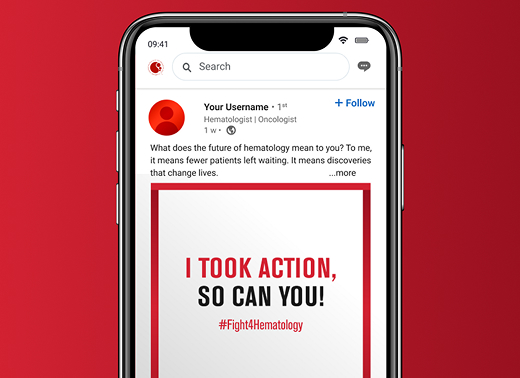
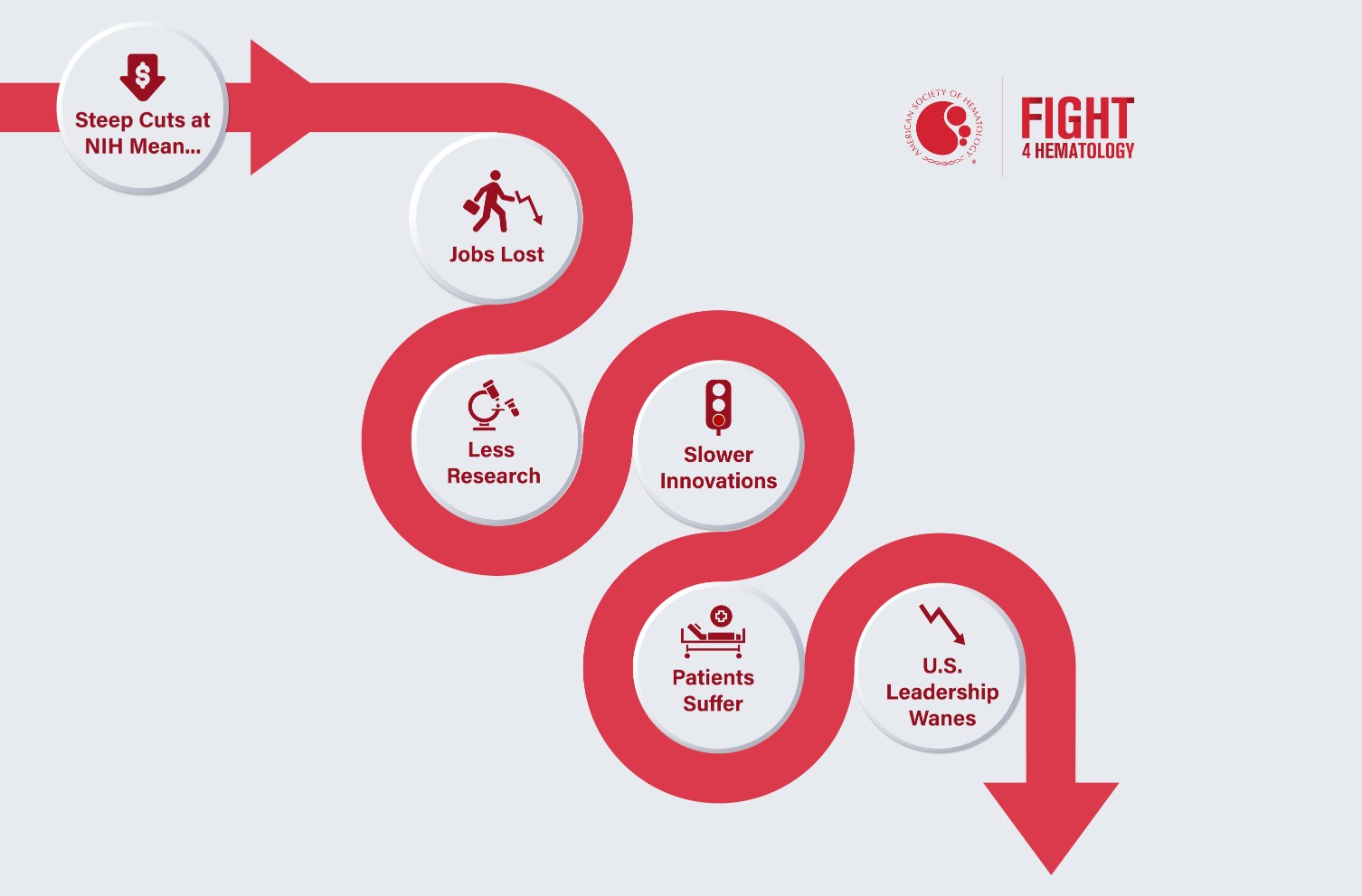
Amplify in Your Network: Research Saves Lives
Deep cuts at the National Institutes of Health (NIH) are poised to have a ripple effect on multiple fronts, including local economies, scientific research, the U.S. stature as a global leader, and, significantly, the lives of countless patients. View and share this page in your networks to help amplify the impact of NIH and medical research.
Investing in research is not optional; it’s lifesaving. I’m alive today because of advances in stem cell transplants and targeted therapies. Federal programs that support patients, caregivers, and equitable access to care are the backbone of recovery. Every dollar toward science is a vote for survival, for hope, for the future.

Donate
Contribute to the ASH Foundation to support additional ASH Awards to ensure that hematologists can continue their vital research without interruption.
Hematology brings the world of science and medicine together, and ASH is the conduit for this community. We have to make sure we support our youngest and most vulnerable members, because we cannot afford to lose a generation of hematologists and researchers due to funding uncertainty.
News and Updates
Stay up to date on ASH’s advocacy work. Get the latest news and policy developments affecting the hematology community.
ASH Launches Treating Fairly Research Award
Federal funding cuts are affecting research around disparities in hematologic conditions. ASH is supporting these investigators with a new funding program: the Treating Fairly Research Award. This program will lead to better understanding of health outcome gaps and interventions to help all hematology patients.
ASH Announces 2026 Scholar Award Recipients
As part of ASH's $12 million commitment addressing ongoing threats to hematology research, the Society awarded 18 additional Scholar Awards compared to the previous year, increasing its total investment across all awards programs to more than $20 million in 2025-2026. In conjunction with this commitment, ASH revised the Scholar Award eligibility criteria to better connect applicants with the right award.
ASH Statement on NIH and HHS Funding in House and Senate Appropriations Bills
The American Society of Hematology (ASH) applauds the House and Senate Appropriations Committees for rejecting the Trump administration’s proposed cuts to and restructuring of the National Institutes of Health (NIH) but urges Congress to also reject the proposed cuts to the Centers for Disease Control and Prevention (CDC).
Testimony and Correspondence
View formal congressional testimony and correspondence related to issues affecting hematologists and their patients.
ASH and Over 140 Groups Urge Congressional Leadership to Finalize Robust FY 2026 NIH Funding
ASH joined 140 other organizations in urging Congress to swiftly finalize the FY26 Labor-HHS bill and provide at least $48.7B for NIH in FY26.
ASH Joins 230 Groups in Letter Urging Congressional Oversight of New Childhood Vaccine Recommendations
ASH joins more than 200+ organizations urging congressional oversight regarding the abrupt changes to the U.S. childhood vaccine schedule.
ASH Signs on to a Statement of Support for AAP v Kennedy
ASH has signed on in support of the plaintiffs in American Academy of Pediatrics et al. v. Kennedy et al., alongside 70+ organizations. An evidence-based vaccine advisory process is essential to public health and scientific integrity.
Resources
ASH fights for hematologists at all career stages with resources that empower them and support growth and innovation.






